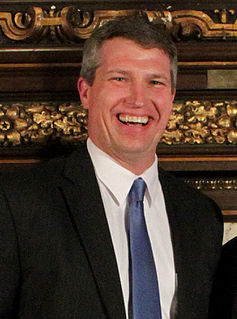A Quote by Clifford Geertz
I have a social philosophy; you have political opinions; he has an ideology.
Quote Topics
Related Quotes
The adjective "political" in "political philosophy" designates not so much the subject matter as a manner of treatment; from this point of view, I say, "political philosophy" means primarily not the philosophic study of politics, but the political, or popular, treatment of philosophy, or the political introduction to philosophy the attempt to lead qualified citizens, or rather their qualified sons, from the political life to the philosophic life.
My social philosophy may be said to be enshrined in three words: liberty, equality and fraternity. Let no one, however, say that I have borrowed by philosophy from the French Revolution. I have not. My philosophy has roots in religion and not in political science. I have derived them from the teachings of my Master, the Buddha.
Political philosophy is realistically utopian when it extends what are ordinarily thought to be the limits of practicable political possibility and, in so doing, reconciles us to our political and social condition. Our hope for the future of our society rests on the belief that the social world allows a reasonably just Society of Peoples.
Political dissension is doubtless a less evil than the lethargy of despotism: but still it is a great evil, and it would be as worthy the efforts of the patriot as of the philosopher, to exclude its influence if possible, from social life. The good are rare enough at best. There is no reason to subdivide them by artificial lines. But whether we shall ever be able so far to perfect the principles of society as that political opinions shall, in its intercourse, be as inoffensive as those of philosophy, mechanics, or any other, may well be doubted.
Whatseems to take place outside ideology (to be precise, in the street), in reality takes place in ideology. What really takes place in ideology seems therefore to take place outside it. That is why those who are in ideology believe themselves by definition outside ideology: one of the effects of ideology is the practical denegation of the ideological character of ideology by ideology: ideology never says, 'I am ideological.'
Since the 1960s, we have seen the failure of the melting pot ideology. This ideology suggested that different historical, cultural and socioeconomic backgrounds could be subordinated to a larger ideology or social amalgam which is "America." This concept obviously did not work, because paradoxically America encourages a politics of contestation.
Another thing I think should be avoided is extremely intense ideology because it cabbages up one's mind. You see it a lot with T.V. preachers (many have minds made of cabbage) but it can also happen with political ideology. When you're young it's easy to drift into loyalties and when you announce that you're a loyal member and you start shouting the orthodox ideology out, what you're doing is pounding it in, pounding it in, and you're gradually ruining your mind. So you want to be very, very careful of this ideology. It's a big danger.




































